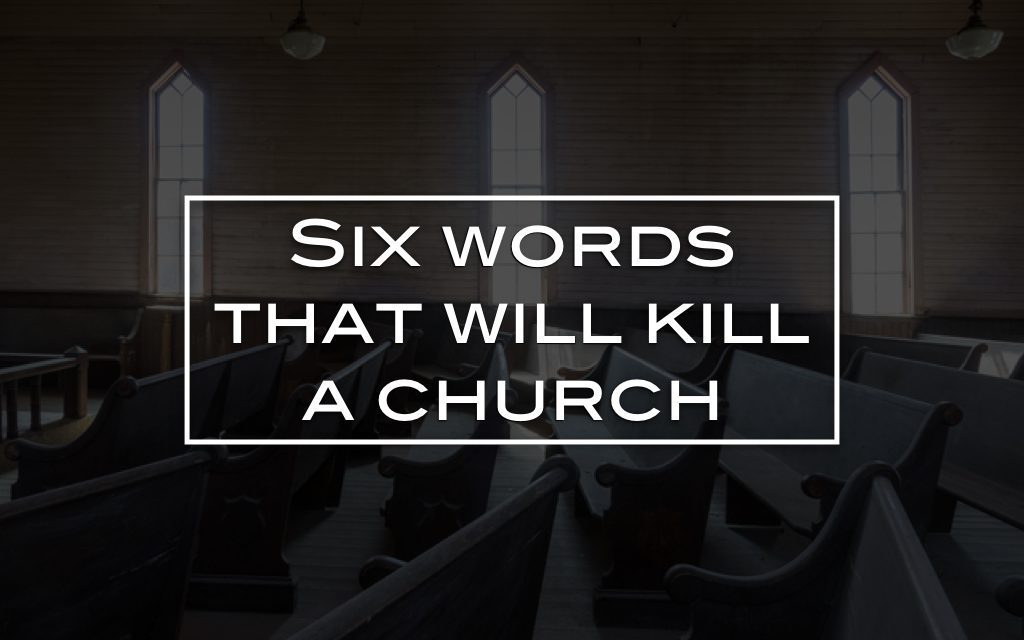By Jack Wilkie
It’s not really a secret that many churches are dying. As church attendance drops with each passing generation and many people being drawn to big, program-heavy churches in larger population centers, plenty of churches are simply drying up as their older members pass away. Of those that are still around, many churches are currently in a make-or-break state where what they do over the next 3-5 years will determine if they will fade away like so many churches before them or if they will thrive.
That’s why every church needs to remove the following sentence from their vocabulary:
“We’ve always done it that way.”
One of the biggest determinants of a church’s fate lies in their willingness to adapt for the congregation’s growth. Obviously I’m not talking about changing doctrine to bring people in, but everything outside of doctrine should constantly be examined as to its effectiveness and – more importantly – its faithfulness to the Scriptures. Matters of liberty like our methods of evangelism (door knocking, holding events, advertising, etc.), our meeting times, our benevolence, our efforts at fellowship, and the like should all be on the table. It’s simply bad stewardship to do things a certain way because of tradition. In fact, in a number of cases things have gone on unscripturally because of a refusal to reconsider old, familiar ways of doing things. Everything we do should be done with an eye toward pleasing God as living sacrifices (Romans 12:1).
When we make this excuse the basis of our church’s actions, we commit all kinds of errors. Here are four obvious ones. See if you can come up with more.
“We’ve always done it that way” kills new energy.
How many energetic disciples have had their enthusiasm squelched by tradition-worshiping church leaders who refused to even consider adapting anything? More than I’d care to know. Each person in the church has something to contribute in building each other up (Ephesians 4:11-16). That means some people are going to be really good “idea people.” Let’s listen to them.
“We’ve always done it that way” idolizes the past.
Even from a business standpoint, it’s absolutely foolish to not consider adaptation. Many of our old methods worked really well for years, but a lot of them just don’t anymore. For example, it’s really hard to get people to come out of their houses to sit for two hours in a tent meeting in the age of social media, Netflix, and YouTube. The reason the church did so well in times past was A) because they adapted to the world around them (think Jule Miller) and B) they wanted to be faithful to the Word. If they had built their churches on how things had always been done, we wouldn’t have had the countless baptisms that came from the biblical act of engaging in the lives of their neighbors combined with the latest technology of film strips. Idolizing the past leads to certain death.
“We’ve always done it that way” removes faith from the equation entirely.
When we utter this phrase, we reveal that our faith is in our methods and our own wisdom. It’s a refusal to let God guide our efforts. It’s also a refusal to say any meaningful prayers for growth, because the message is essentially, “We’re either going to grow by doing it the way we always have, or we aren’t going to grow it all. We’d rather die than change.” Why pray if we aren’t willing to follow the doors God opens for us?
“We’ve always done it this way” woefully disorders our priorities.
If we all come together with the Great Commission (Matthew 28:18-20) on our hearts, none of this will be a problem. We’ll be so dedicated to reaching the lost and making disciples of our own people that we won’t let anything stand in our way. That’s why it’s so troubling when churches throw out this excuse. They’re demonstrating that they care more about preserving a tradition than they do about saving souls.
So what can churches do? As always, start with prayer. Then open the Scriptures. List everything the church does, every program in place, everything done in the times you’re gathered, and separate biblical doctrine from traditions and preferences. Then put every tradition and preference on the table and examine it by the Word and by its effectiveness. Listen when people have new ideas for how to reach, teach, or serve people.
Everything we do must be guided by prayer, God’s word, and an unwavering determination to please Him. Once we do that we’ll realize the absurdity of building a church on the way we’ve done things, and we can start rebuilding on the way Jesus would do things.
Six words that will kill a church





